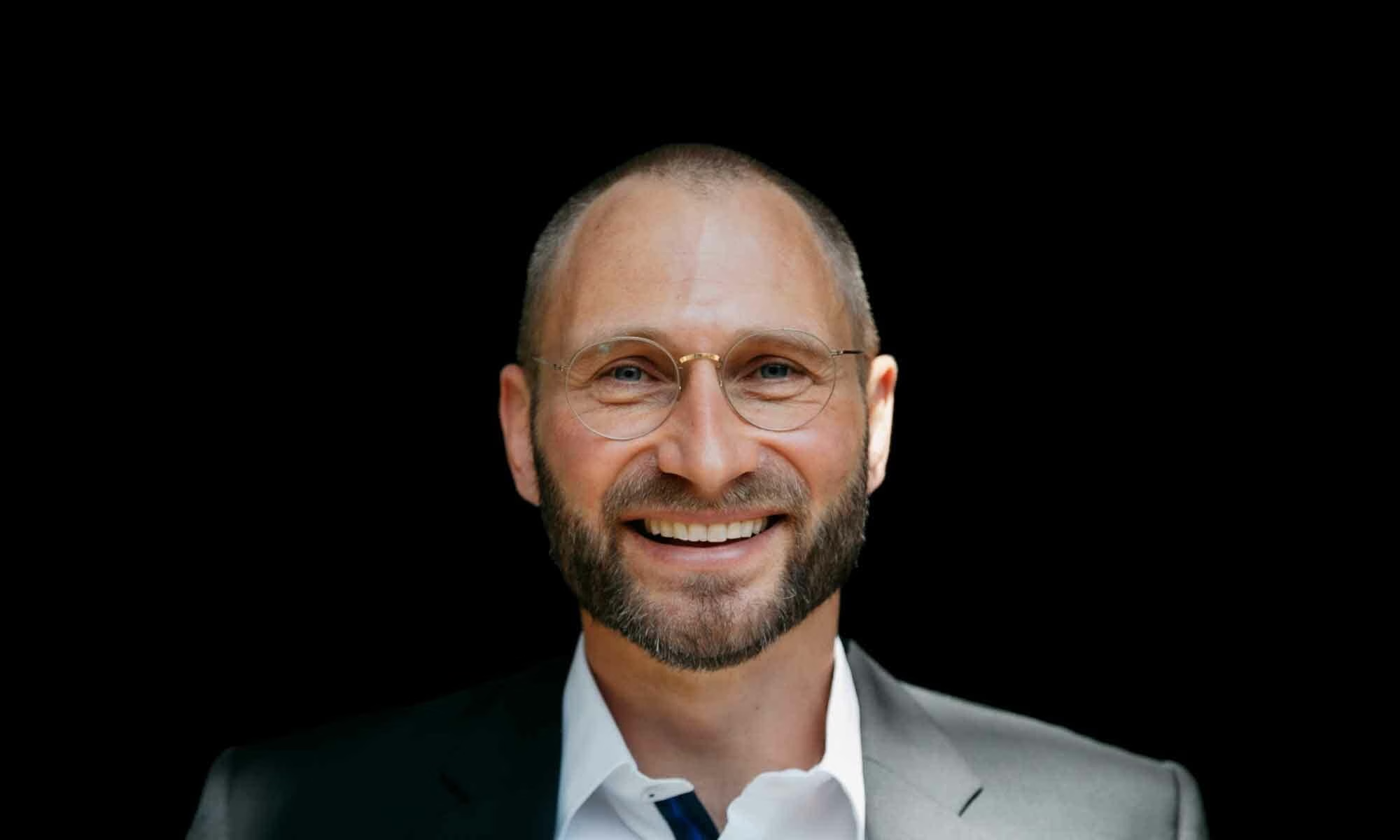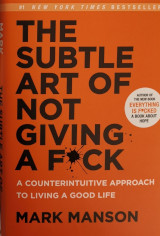A Counterintuitive Approach to Living a Good LifeAs the title suggests, Manson wants his book to stand out from the usual life advice books. Because these usually emphasize what you could or should achieve - higher, faster, further (see, for example, the book "How to achieve more"). Game Changers). The downside, however, is that you are made very aware of what you have not achieved so far. You haven't achieved this or that, you're not exceptional. And the usual (American?) life guides are all aimed at helping you to finally be extraordinary and achieve all your goals.
In his book, Manson shows a different path to personal success. The book is also available in German ("The subtle art of shitting on it“ view at Amazon), but with this book in particular it should be almost impossible to convey the "spirit" of the book correctly in German. While "to give a fuck" is ambiguous in English and the author uses the expression creatively, that alone is difficult in German. Let's see if I have succeeded.
The conclusion of the book in one sentence
Life is short, so you should actively choose what matters to you personally and what doesn't - or as the author puts it: "There is a subtle art to not giving a fuck. And though the concept may sound ridiculous and I may sound like an asshole, what I'm talking about here is essentially learning how to focus and prioritize your thoughts effectively-how to pick and choose what matters to you and what does not matter to you based on finely honed personal values. This is incredibly difficult. It takes a lifetime of practice and discipline to achieve. And you will regularly fail. But it is perhaps the most worthy struggle one can undertake in one's life."
Renouncing the tyranny of the extraordinary
Even though it is encouraged in our culture, and particularly in American culture, to want to be exceptional, this is essentially an impossible undertaking. After all, if everyone were exceptional, no one would be exceptional by definition alone. But being average, at least some life guides suggest, seems to be the new failure. Yet, according to Manson, you have to realize that we are all pretty average at pretty much everything we do. That's quite normal. If you want to be exceptional at something, you have to invest an incredible amount of time in that one thing - and we all have limited time and energy. The few people who are really exceptional at something don't do it because they believe they are inherently exceptional, but on the contrary because they are obsessed with becoming better. So they don't feel exceptional right now, they know they are not and are working on it. Even if the mantra that anyone can be extraordinary and achieve great success sounds great, it is unhealthy because it is de facto unattainable. The key to mental and physical health is to realize and accept that your actions don't mean that much in the grand infinite universe, that most of life is rather boring and not newsworthy, and that that's perfectly okay.
The journey is the destination
The author describes a basic problem as the assumption that happiness follows an algorithm: as long as you work hard for it, you get it (as a reward). And many people are driven by this: If I achieve X, I'm happy. If I look like Y, I'm happy, etc. But this approach is precisely the real problem: happiness is not a solvable equation. Constant effort, setbacks and disappointments are part of it and are the perpetual motion machine for achieving lasting happiness. And accepting this, i.e. that achieving happiness is not a final state, is the prerequisite for being able to be happy at all. Because you will always have problems, they will just be replaced or given an upgrade. True happiness can therefore only be achieved if you learn to appreciate the process of solving problems. For example, people who like the effort of sport become the best athletes (in their field). According to the author, it is not about willpower or perseverance or "no pain, no gain", but rather that the problems we take on determine our success and bring us better and better problems. It is therefore a never-ending upward spiral. And if someone thinks they can stop climbing the spiral at some point, they have not understood the most important point: because climbing has to be fun if you want to be happy. Or to put it another way: the journey is the destination and cherish the moment.
Define and pursue your own goals and values
So that you can use your energy in a targeted way, you should also think about what is really important to you and invest in exactly that ("give a fuck") or leave it alone. That's why the author encourages you to think about your basic goals/values. To do this, he first breaks down a few "typical" life goals, such as "pleasure". He writes that pleasure is great, but it's a horror if you orient your life towards having as much pleasure as possible: "Ask any drug addict how his pursuit of pleasure turned out. Ask an adulterer who shattered her family and lost her children whether pleasure ultimately made her happy. Ask a man who almost ate himself to death how pleasure helped him solve his problems. Pleasure is a false god". He takes a similar view of the pursuit of material happiness. Once you have satisfied your basic physical needs, such as accommodation, food, etc., your sense of happiness does not increase exponentially or linearly with more things you can afford, but rather begins to stagnate at a certain point. In addition, he sees - not entirely unjustified in my opinion - the danger that other values such as honesty, non-violence or compassion tend to fade into the background for people who focus their lives on material gain: "When people measure themselves not by their behavior, but by the status symbols they're able to collect, then not only are they shallow, but they're probably assholes as well."
He describes other bad, unhealthy values as: dominating through manipulation or violence, indiscriminate sex, wanting to feel good all the time, always wanting to be the center of attention, never wanting to be alone, wanting to be liked by everyone, being rich for the sake of being rich. He names the following positive, healthy values: honesty, the will to innovate, vulnerability, standing up for yourself and your opinion, standing up for others, self-respect, curiosity, charity, humanity and creativity. He shows that the bad values depend on external things, while the good values can be found within oneself. You can orient yourself towards them at any time and live up to them. "This, in a nutshell, is what "self-improvement" is really about: prioritizing better values, choosing better things to give a fuck about. Because when you give better fucks, you get better problems. And when you get better problems, you get a better life. Problems may be inevitable, but the meaning of each problem is not. We get to control what our problems mean based on how we choose to think about them, the standard by which we choose to measure them."
Say no
Once you've consciously addressed your goals and values, it's important to stay true to them and pursue them. There are a few things you should be aware of: the author makes it clear (just like Steven Covey in "The 7 Habits of Highly Effective People") that you can only achieve your goals if you reject things that don't fit in with your goals and values. So you also have to be able to say no. This is directly related to the fact that you have to be able to live with how these conscious decisions affect others. Or as the author puts it: "Not giving a fuck does not mean being indifferent; it means being comfortable with being different." On the other hand, you also have to be aware that you always have a choice and always make decisions or choices - including when it comes to evaluating perceptions: "Whether you realize it or not, you are always choosing." And accordingly, you are also responsible for your choices.
Taking responsibility
According to Manson, the root of personal development is realizing that you are responsible for everything in life - no matter what the external circumstances are. We can't always control what happens around us or to us, but we can control how we interpret events and whether and how we react. And the more you accept and actively take on this responsibility, the more power you have over your own life. Taking responsibility for your problems is the first step to solving them.
The author's discourse on the subject of responsibility and guilt is also interesting - the two are easily lumped together but are quite different. His approach is as follows: Guilt is past-oriented. It results from decisions that have already been made. Responsibility is the result of the choices you make every moment. It is not your fault that I have decided to write this text, but you are responsible for the fact that you are reading it right now - or not 😉. So you can blame many things or people for your unhappiness, but no one else is responsible for making you feel unhappy. Because you always choose how you evaluate things, how you react to them: "You always get to choose the metric by which to measure your experiences." In my opinion, there is definitely a kernel of truth in this message from the author, but the topic of guilt, attributing guilt and taking responsibility is, in my opinion, very complex and should be worked out in a much more differentiated way. The author does this to some extent in his book (e.g. with regard to strokes of fate). So it's best to read it for yourself 😉, but it's far too much to go into here.
Learning from mistakes
Manson emphasizes, and here I can agree with him 100%, that failures in particular contribute to becoming successful, as long as you own up to your mistakes and learn from them. Real personal development is only possible if you can admit to your own negative characteristics or character traits and actively work on them.
Overall rating

Overall rating: 3 out of 5 stars. All in all, a thoroughly funny and interesting book. The wit of the book often lies in the metaphors and the combination of wisdom with sometimes quite vulgar language. But the latter in particular seems rather forced in some places, so that the "F-word" comes up again. The author uses this word to present his content to the reader in a way that is not necessarily new, but modern - old wine in new bottles. But a good wine for my taste! And as must be the case with a good sip of wine, it stimulates more profound thinking and makes you smile as you enjoy it. And even if the density of content decreases noticeably in the second half of the book and you could summarize the sheer wisdom of the book in a few sentences, you can definitely enjoy it because it is refreshingly different.
If you like the book, I also recommend "Atomic Habits" or "The 7 Habits of Highly Effective People. Powerful lessons in personal change„.


